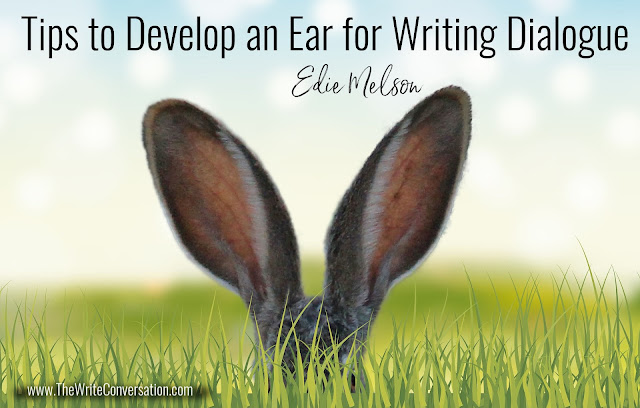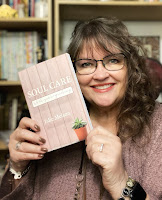by Edie Melson @EdieMelson
I read somewhere once that good dialogue is a conversation with the boring parts taken out. I completely agree. Just record and transcribe a normal conversation and you’ll see that it isn’t all that interesting to read without a lot of judicious editing.
But even armed with that knowledge, how do we as writers, determine what’s boring and what’s not? That’s a skill that takes practice.
I believe good dialogue is more like music than anything else. We start with the rules, learning the craft and the technique. But to become masters we must develop an ear, a sense if you will, of what translates well to the page and what does not.
Today I’m addressing how to develop an ear for dialogue. The foundation for that lies in eavesdropping. Although we rarely reproduce something we hear word-for-word. There is a natural cadence to dialogue that comes only by listening. We must learn to edit dialogue down to its essence without loosing that rhythm.
Tools of the Trade
Professional eavesdroppers need tools to be effective. It does us no good to hear a great conversation if we can’t remember it. So I encourage you to always have some way to record those overheard gems. You can, and should, use several things:
- Pen and Paper.
- Voice Memo App or Digital Recorder.
- Smart Phone Apps (note taking apps, recording apps, even capturing images).
Be sure to take time to practice with these tools. Keep several with you because your circumstances will often dictate the one best suited for the occasion. For example, it’s hard (and potentially deadly) to use paper and pen when you’re driving.
Places to Practice the Craft of Professional Eavesdropping
There are a lot of places to practice the craft of professional eavesdropping. Pretty much any place two people can hold a conversation will do. But my time is limited, so I try to search out the places that have the best conversations when I’m on a dialogue hunt.
- Coffee shops: people tend to bare their souls to one another over coffee. This makes for a great environment for juicy tidbits.
- Places where preschoolers and parents gather: Are any of you old enough to remember the television show hosted by Art Linkletter, Kids Say the Darndest Things? Whether you do or not, it’s true. And conversations between kids and adults are ripe with quotable bits.
- The radio: I know, I’m really showing my age in this post. But talk radio, or even radio programs with multiple hosts are good.
Things to Listen For
- A colloquialism—that turn of phrase that immediately sets the reader in a specific geographic region or time-frame.
- The differences between men and women—how they talk, that is. Men use different words from women. Words like precious, lovely, and polka dot tend to only be found coming from the mouths of women. There are exceptions, but you get the idea.
- The length of time each person spends talking before the other person interrupts. This is fascinating to me. I had no idea we were such a rude society. We finish each other’s sentences, interject opinions and cut one another off with amazing regularity. And we rarely lecture.
Things to Watch For
Good dialogue isn’t just words in quotation marks. It’s also the descriptive bits that give us context to what is happening. This includes:
- facial expressions
- hand movements
- body language, etc
Listen to the words and watch the faces. “You’re kidding.” Can be expressed with shock, awe, mortification, anger, any number of emotions. Decipher what exactly it is that tells you the emotion of the person delivering the exclamation. Then make a note of it.
Look at the position of the speakers in relation to each other. Do they lean in? Lean out? Does one of them seem annoyed, how can you tell. These are the small things that make great books.
I could have gone twice as long with this post because I’m fascinated by this subject. But now I’d like to hear from you. Have you eavesdropped on any interesting conversations lately? What insight have you gleaned that you can transfer to your writing?
TWEETABLE
Edie Melson is a woman of faith with ink-stained fingers observing life through the lens of her camera. No matter whether she’s talking to writers, entrepreneurs, or readers, her first advice is always “Find your voice, live your story.” As an author, blogger, and speaker she’s encouraged and challenged audiences across the country and around the world. Her numerous books reflect her passion to help others develop the strength of their God-given gifts and apply them to their lives. Connect with her on her website, through Facebook, Twitter, and Instagram.


Thank you for your specific help and tools in this article. The reference to music helps me understand the need to listen and practice. (I teach music!)
ReplyDeleteI need this help in my writing. Thank you.
Toni, I'm so glad this was helpful! I come from a musical family and when someone first told me words are like music it was a lightbulb moment for me! Blessings, E
DeleteGreat words and helpful hints, Edie. Thank you for sharing.
ReplyDeleteDiane, thank you for stopping by! Blessings, E
DeleteI was sitting in an ICU waiting room one day and the family next to me was talking about the person they were there to see. One of the men said, "He crazy as a road lizard."
ReplyDeleteI've never forgotten that, especially since that was the first time I'd heard that phrase.
This is great and will so useful to writers of all stages. I'm an eavesdropper and have spent a lot of time at the med center while husband had treatments for cancer as well a lot of time airports. The conversations can be very revealing, but the facial expressions and body language I will now pay more attention to as well. Thanks.
ReplyDelete